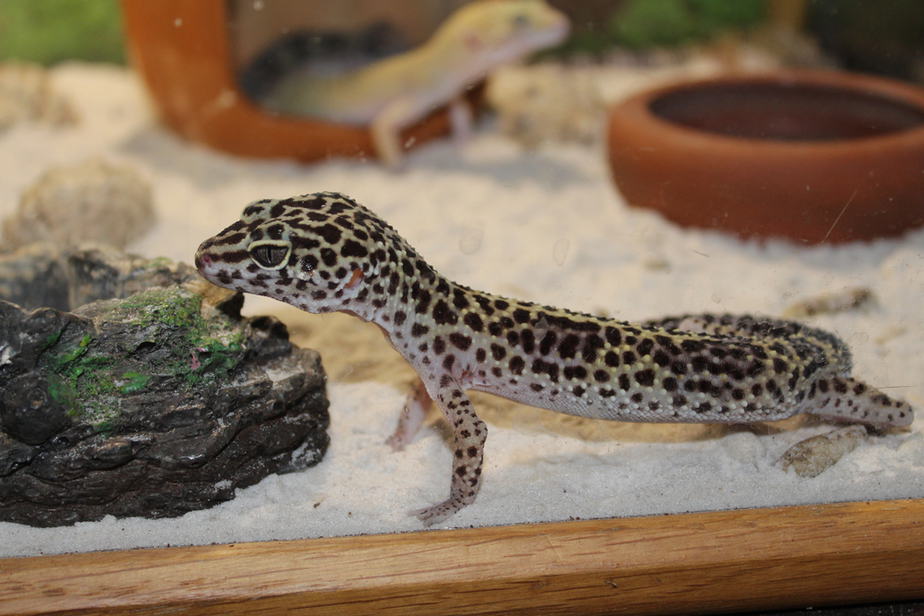We all know that dogs need companionship, but what about your Leo? Do Leopard Geckos get lonely if they’re by themselves for too long? Should you partner them up with other Leopard Geckos? Here’s what you need to know.
So Will Your Leopard Gecko Get Lonely?
Leopard Geckos do not get lonely. They are solitary creatures and generally prefer it that way. Male leopard geckos, in particular, are territorial and will fight with each other. Leopard geckos make excellent first pets for new reptile owners due to their solitary nature.

Do leopard geckos do better in pairs or alone?
This depends on the leopard gecko’s sex. A male, for example, can easily share a room with one to several ladies. The leopard geckos will be stressed, violent, and anxious if they share a room with another male.
Only during mating season can male and female leopard geckos associate with one another. When a leopard gecko is born, the mother is rarely around to care for the young.
Leopard geckos communicate with their tails, so keep an eye on the tail if you decide to keep them together. If the leopard gecko’s tail is moving in a sluggish back-and-forth motion or is lifted, the gecko is in danger. This generally means that the male is getting ready to attack another male.
If this happens, separate the geckos immediately. Female geckos may be able to form partnerships depending on how they communicate. If you wish to keep two leopard geckos together, females are typically the best choice because they are less territorial.
What can happen if you get a partner for a leopard gecko?
Here are the reasons why you should probably just avoid getting a partner for the leopard gecko:
• The presence of another leopard gecko can make your leopard gecko feel threatened, causing defensive attacks.
• They can both fight each other on their own to be the remaining gecko in the tank. Which results in biting, scratching, or even a dropped tail.
• They could bully one another into not being able to eat. Guarding the food bowl in the tank, and attacking when one comes near.
• Along with feeling threatened and defensive attacks, they can also end up de-gloving each other. Degloving means there was a chunk of tissue was removed from the body, resulting in an extensive section of skin is completely torn off the underlying tissue. Severing the blood supply.
• They could develop health risks the other leopard may have, or just from having another leopard gecko in the tank with them.
Because we are sociable creatures, I’m sure we humans think our leopard geckos are lonely. They are, nevertheless, solitary creatures who do not mind being alone. It’s safer to avoid bringing a partner into the tank with your leopard gecko.
Do leopard geckos need love?
Because leopard geckos are solitary creatures, only keep a female and a male leopard gecko in the same tank during breeding season. The reason for this is that opposite-sex geckos are prone to rejecting one another.
Except during mating season, opposite sex geckos will always reject each other, and even if they appear to be hugging, they are actually taking warmth from the other gecko. I would avoid placing a mate in with your leopard gecko, regardless of sex, because this is how they demonstrate their dominance.
If they do mate during mating season, make sure the female is separated from the male in a separate tank. While pregnant, female geckos can still become quite anxious, which can be hazardous to the young gecko.
Could you put a younger gecko in the same tank with an older one?
Younger geckos should be housed alongside other young geckos, as this may reduce the antagonism they may experience as a result of growing up alone.
When a younger gecko is housed alongside an older gecko, the older gecko may intimidate the younger. They bully them the same way they bully older geckos, which could give the younger gecko undue stress.
When a juvenile gecko is anxious, he or she will normally stop eating. It’s possible to share a room with an adult female gecko and a younger male gecko because females aren’t as aggressive or territorial.
When dealing with leopard geckos, tread carefully and keep an eye on their tails for any menacing behavior.
Final Thoughts
Avoid pairing your leopard gecko unless it is mating season. There are certain situations where geckos can be partnered. Assign younger geckos to each other and see how they interact. This may be useful in the future in case there is any animosity. If you have to partner male leopard geckos, try acquiring a bigger tank to see if that helps with the territorial, defensive feelings they may have.
